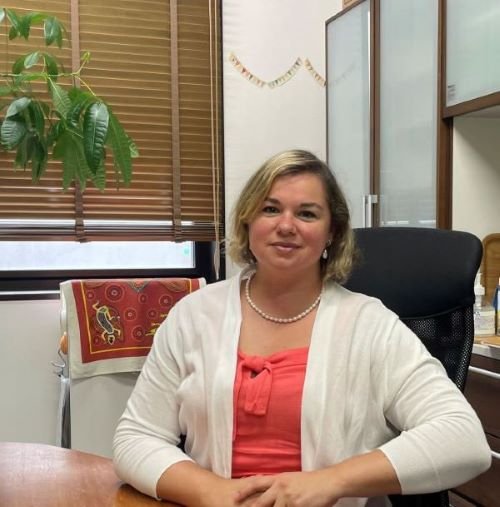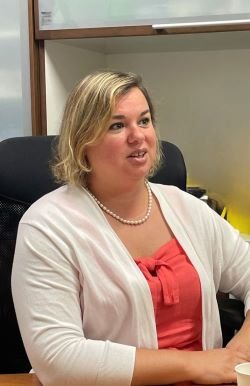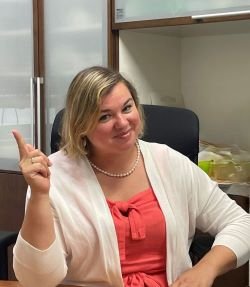

客員ファカルティーにインタビュー! 第19回

Dr. Tatiana Karabchuk visited our institute for three months, from May 10 to August 9, 2024, as a visiting faculty. She is an associate professor at the Department of Government and Society in the College of Humanities and Social Sciences of United Arab Emirates University. Her research interests include studies of the youth, labor markets, quality of life, and gender equality values. Below is an interview highlighting her academic journey, professional experiences, and advice for aspiring scholars.
Q. How did you decide to become an economist?
Actually, I am not a pure economist but an economic sociologist. My interest in economics began in high school, where I attended specialized classes in economics and mathematics. I initially chose sociology and management because I was not that confident to get excellent scores necessary for entering the field of economics, but it turned out that economics was my favorite subject in which I always received the highest grades. I really liked the combination of population studies and economics.
Q. Were specialized economics classes common in high schools?
Yes, in Moscow, students could select specialized tracks in fields like medicine, biology, IT, and economics in high schools. At that time, Russia's education system required students to pass separate university entrance exams for their chosen field of study.
Q. What inspired you to specialize in economic sociology?
Several professors had great influence on me. Among them, Vladimir Gimpelson, who taught Political Economy at my university, was particularly inspiring. His course led me to look into labor market studies. During my fourth year, I joined the Center for Labour Market Studies (CLMS) as a junior research fellow, and the following year, they offered me a permanent research position. Since then, my specialization has been labor markets.

Q. Why did you choose to work in the UAE?
My decision was motivated by both professional and personal factors. The UAE offered better economic conditions, a balanced lifestyle, and exposure to international collaborations. I was also drawn to the Gulf region after attending the annual World Innovation Summit for Education in Qatar, an event led by Sheikha Moza, for three times, which gave me opportunities to observe academic environments in the Gulf countries. In Moscow, I juggled three jobs and worked long hours. I did not have enough time to spend with my children even when they were small. In the UAE, after 3 PM I could focus on personal life, including taking care of children. With better salary, I could also afford to send children to international school. So, all in all, the UAE was an attractive place for me.
Q. Have you faced any gender-related difficulties in the UAE?
Not at all. The UAE promotes gender equality and enforces anti-discrimination laws. I feel that women are supported and respected. It is a very good environment for women's professional development.
Q. Could you explain your research in simple terms?
My research topics include youth employment, family formation, and gender disparities. For example, I explore if there is any difference between men and women in job search after graduation, what makes them prioritize having children instead of entering the labor market, how job stability influences decisions about marriage and childbearing, and so on. Another topic that I am doing research now is the quality of life, namely, what determines our happiness and well-being and how they are related to labour market outcomes. For example, I examine how happiness or unhappiness pushes us to make migration decisions. Additionally, I study academic productivity, investigating gender inequality and job satisfaction within academia.
Q. According to your research, the quality of life depends a lot on the first job, is that right?
In general, the quality of employment plays a pivotal role in determining life satisfaction. Factors such as salary, relations with management, workplace environment, and job stability affect our overall happiness. I have not conducted specific studies on first jobs in the UAE because it requires longitudinal studies, but job quality--whether it's the first, second, or third--definitely impacts life satisfaction.
Q. How has your experience in living in Japan, or Kunitachi in particular, been?
This is my second research visit to Kunitachi, and it has been great. In my first visit, six years ago, with my young children, I appreciated the safe environment. It's comforting to walk freely at night without concern. The people here are very helpful, too. And the food is also amazing. In Kunitachi, you can find good American, Italian, Thai, Vietnamese, Chinese, and, of course, Japanese cuisine. During this visit, I also made small trips around Tokyo with my husband, which was very nice. For me, Kunitachi is the place where I am most productive and I can write several research papers to publish in good journals.

Q. What advice would you give to young scholars?
Follow your passion and choose a field that is exciting to you. Explore many subjects while young, as this exploration helps learn your true interests. I am quite happy where I am because I love what I am doing. Economic sociology is a discipline that examines people's behaviors, explains and predicts trends and patterns among the current population, and recommends social policies to make life better and promotes sustainable development. If you are passionate about addressing social challenges and contributing to sustainable development, this field offers great opportunities.
*******************************
Dr. Karabchuk's career demonstrates the value of passion and dedication in research. Her insights and experiences will undoubtedly inspire young scholars. We thank her for sharing her journey and wish her continued success in her endeavors.
Interviewers: Sawa Wakatsuki and Nana Yamamoto, CEI (recorded on August 6, 2024)
************************************************